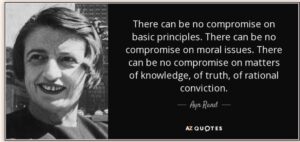Rather frequently there appears in my LinkedIn thread a picture of Ayn Rand, the darling of the libertarian right, accompanied by a quote from one of her works. Sometimes the picture and the quote are considered sufficient by themselves, sometimes there is an accompanying commentary. While it would obviously be wrong to assume that the people behind these posts agree with each other on everything else as well, some generalisations can surely be made. It seems highly improbable that any of them would have voted for Harris in the 2024 presidential election, and very likely that, while some of them may have remained true to their libertarian principles and declined to vote at all, many will have lined up behind Donald Trump.
How is that working out for them? Judging from what has happened since, they nay be feeling themselves trapped between two distinct ‘philosophies’ that are directly opposed to each other. Evidence for this abounds on all sides, with Trump’s record on one side Rand’s ‘objectivism‘ on the other. Just two excerpts from Atlas Shrugged, her best-known work, should be sufficient to make that case. One of these is taken from the book’s final pages, in which Judge Naragansett is seen drafting an amendment he thought necessary to the US constitution.
Congress shall make no law abridging the freedom of production and trade.
The other comes from John Galt’s long rambling rant to the nation over the broadcasting system he had successfully hacked. Close to its conclusion, he said:
The only proper functions of a government are: the police, to protect you from criminals; the army, to protect you from foreign invaders; and the courts, to protect your property and contracts from breach or fraud by others, to settle disputes by rational rules, according to objective law.
It has to be admitted that these two extracts are not entirely consistent. Galt seems to be proposing the total abolition of the US constitution, whereas Naragansett simply wishes to amend it. How that conflict would have played out in the new, Randian, US that followed the total collapse with which the book closes we will never know, but the libertarian thrust in both is clear.
Neither, however, is compatible with the Trump presidency, the outstanding aspect of which so far has been rule by executive order, with its most striking feature the promotion, imposition, escalation, de-escalation and re-escalation of import tariffs. Given how much US business in general and its manufacturing arm in particular depend on imports, it is hard to think of any action that would represent a greater interference by government in production and trade. Only a sophist would attempt to argue that Narragansett specified ‘congress’, leaving it open to the executive to indulge in massive ‘abridging’.

A LinkedIn favourite. There seems no way approval of these thoughts could be compatible with a vote for Donald Trump.
The second example has currently a much lower profile, but strikes right at the heart of the Galt/Rand project of a state governed by the rule of law. Can that rule, or a state built upon it, survive when the executive arm embarks on a campaign to subvert it? Even the libertarian Heritage Foundation recognised the danger inherent in the use of executive orders, citing the following principles:
“There can be no liberty where the legislative and executive powers are united in the same person.” –Charles-Louis de Secondat, Baron de Montesquieu.
“The accumulation of all power, legislative, executive, and judiciary in the same hands…may justly be pronounced the very definition of tyranny.” –James Madison, Federalist 46
“All legislative Powers herein granted shall be vested in a Congress of the United States, which shall consist of a Senate and House of Representatives.” –U.S. Constitution, Art. I, § 1
“The executive power shall be vested in a President of the United States of America.” –U.S. Constitution, Art. II, § 1, cl. 1
Admittedly the Heritage article, which focussed on perceived abuses by President Clinton, was written in 2001, but surely constitutional principles are not dependent on who is in power? Indeed, that could be considered to be itself a constitutional principle. Central to both Galt’s summary and the quotations in the Heritage Foundation document is the independence of the judiciary, and since interpretations may differ, the right of both sides in a disagreement to argue their cases before an impartial judiciary is absolutely fundamental. If only one side can be presented, that is tyranny, but that does not deter Donald Trump. Law firms that arouse his ire by arguing for a position different from his are being sanctioned. It takes just these two examples, or even just one of them, to show that you cannot support both Trump and Rand, and, given the very different approaches to the truth, the libertarian must surely come down on the side of Rand.
Where does that leave my own thesis, which is that Rand was, to put it kindly, rather limited intellectually? Those limitations she demonstrated in imagining a Utopia but in failing to recognise the absence of anything in her ‘philosophy, dependent as it was on the universal acceptance of moral law, that would prevent the ascendancy in it of a ‘philosophy’ that recognised no such thing.
